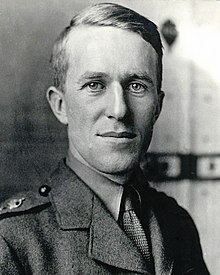
Back T. E. Lawrence Afrikaans توماس إدوارد لورنس Arabic توماس ادوارد لورنس ARZ Thomas Edward Lawrence AST Tomas Edvard Lourens Azerbaijani توماس ادوارد لورنس AZB Томас Эдвард Лоўрэнс Byelorussian Томас Эдўард Лоўрэнс BE-X-OLD Томас Лорънс Bulgarian টমাস এডওয়ার্ড লরেন্স Bengali/Bangla
T. E. Lawrence | |
|---|---|
 Lawrence in 1918 | |
| Birth name | Thomas Edward Lawrence |
| Other name(s) | T. E. Shaw, John Hume Ross |
| Nickname(s) | Lawrence of Arabia |
| Born | 16 August 1888 Tremadog, Carnarvonshire, Wales |
| Died | 19 May 1935 (aged 46) Bovington Camp, Dorset |
| Buried | St Nicholas' Church, Moreton, Dorset |
| Allegiance | United Kingdom |
| Service | |
| Years of service |
|
| Rank | |
| Battles / wars |
|
| Awards | |
| Alma mater | Jesus College, Oxford |
Thomas Edward Lawrence CB DSO (16 August 1888 – 19 May 1935) was a British Army officer, archaeologist, diplomat and writer known for his role during the Arab Revolt and Sinai and Palestine campaign against the Ottoman Empire in the First World War. The breadth and variety of his activities and associations, and Lawrence's ability to describe them vividly in writing, earned him international fame as Lawrence of Arabia, a title used for the 1962 film based on his wartime activities.
Lawrence was born in Tremadog, Carnarvonshire, Wales, the illegitimate son of Sir Thomas Chapman, an Anglo-Irish landowner, and Sarah Junner, a governess in Chapman's employ. In 1896, Lawrence moved to Oxford, attending the City of Oxford High School for Boys and read history at Jesus College, Oxford from 1907 to 1910. Between 1910 and 1914, he worked as an archaeologist for the British Museum, chiefly at Carchemish in Ottoman Syria.
After the outbreak of war in 1914, Lawrence joined the British Army and was stationed at the Arab Bureau, a military intelligence unit in Egypt. In 1916, he travelled to Mesopotamia and Arabia on intelligence missions and became involved with the Arab revolt against Ottoman rule. Lawrence was ultimately assigned to the British Military Mission in the Hejaz as a liaison to Emir Faisal, a leader of the revolt. He participated in engagements with the Ottoman military culminating in the capture of Damascus in October 1918.
After the war's end, he joined the Foreign Office, working with Faisal. In 1922, Lawrence retreated from public life and served as an enlisted man in the Army and Royal Air Force (RAF) until 1935. He published the Seven Pillars of Wisdom in 1926, an autobiographical account of his participation in the Arab Revolt. Lawrence also translated books into English and wrote The Mint, which detailed his service in the RAF. He corresponded extensively with prominent artists, writers and politicians, and also participated in the development of rescue motorboats for the RAF. Lawrence's public image resulted in part from the sensationalised reporting of the Arab Revolt by American journalist Lowell Thomas, as well as from Seven Pillars of Wisdom. In 1935, Lawrence died at the age of 46 after being injured in a motorcycle accident in Dorset.
- ^ "No. 30222". The London Gazette (Supplement). 7 August 1917. p. 8103.
- ^ "No. 30681". The London Gazette (Supplement). 10 May 1918. p. 5694.
- ^ "No. 29600". The London Gazette. 30 May 1916. p. 5321.
- ^ "No. 30638". The London Gazette (Supplement). 16 April 1918. p. 4716.